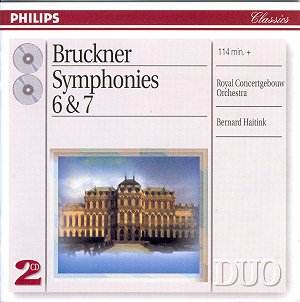Philips here continue their very welcome reissues of
Bernard Haitink’s fine series of Bruckner recordings. I assume that
both readings were set down in the Concertgebouw though that’s not expressly
stated in the documentation. However, the spacious, natural sound for
both recordings is entirely consistent with that building.
The Sixth is, for some reason, something of a Cinderella
amongst Bruckner’s last six symphonies and is less frequently programmed
than the other works of the composer’s full maturity (though things
have improved in recent years.) Why this should be the case I do not
understand for it is a fine, well-structured work, full of memorable
ideas.
The first movement is difficult to pace. The syncopated
violin figure with which the work opens, unique in Bruckner’s output,
can be something of a trap. To my ears Haitink is just a little too
fleet here. Mind you, he’s in good company for his tempo is identical
to that chosen by Günter Wand. Klemperer is much slower (though
his reading, which I have long admired, is now starting to sound just
a bit too massive). Actually, Sir Colin Davis in his newly issued LSO
Live recording seems to me to get the initial speed just right. Of course,
many listeners may well prefer a slightly more urgent approach to this
movement in which case Haitink, as he usually does, makes an entirely
cogent case. In fact, taking the movement as a whole it seems to me
that his control of structure and Brucknerian syntax is as masterful
as I’ve come to expect from him over the years. He’s particularly good
at negotiating transitions of speed and handling the build up to a climax.
The solemn and profound adagio is marvellously laid
out by Haitink. Where Klemperer is gaunt in this movement Haitink is
noble. I can accept either approach but, on balance, I prefer Haitink.
He is assisted by some deeply responsive and understanding playing from
his Dutch orchestra and together they build glowing and majestic climaxes.
In their hands the coda is really deeply felt.
The rest of the performance is on the same high level.
The rhythms in the scherzo are alert and sprightly. In the finale, another
movement which is hard to pace, Haitink’s musical logic and his choice
of tempi seem to me to be pretty irrefutable. In summary, this is a
fine and well thought out performance of the symphony.
Philips have chosen to couple it with Haitink’s first
recording of the Seventh (he re-recorded it with the same orchestra
in 1979.)
This earlier version is quite a bit quicker overall
than the later performance which took 65 minutes (by comparison, Karajan’s
1989 traversal with the VPO took 66’15" and Günter Wand and
the BPO in 1999 took 66’37"). For the most part, however, I didn’t
feel that in this 1966 reading Haitink was pressing forward unduly.
In the first movement some listeners may perhaps feel that he could
allow a little more space in the passage marked ‘Ruhig’ (track 1, 2’03")
but, in fact, his speed is so close to the metronome mark in the score
as to make no difference. I found his account of this movement very
satisfying.
The burnished adagio unfolds with due solemnity, the
Wagner tubas adding an extra richness to the scoring. The ascent to
the main climax (track 2, from 13’44") is controlled by Haitink
with massive assurance and the cymbals and triangle cap a glowing, ardent
dénouement. The coda is all patrician sorrow.
The scherzo, which always conjures up for me a mental
image of knights riding into battle, is very exciting and the scherzo
is generously phrased. The finale is judged very well indeed and is
distinguished by some majestic brass playing, nowhere more so than in
the final peroration (track 4, from 10’40"). Though the brass win
plaudits here, the playing of the entire orchestra is first class throughout
and does full justice to Bruckner’s most lyrical symphony.
These, then, are both highly distinguished performances
benefiting from fine playing captured in excellent, spacious and natural
sound. Bernard Haitink is one of the finest Brucknerians of our age
and these two recordings are excellent examples of his sympathetic and
wholly idiomatic approach to this music. The coupling is most attractive
and as a final incentive to purchase there are good notes in French,
German and English.
Strongly recommended.
John Quinn

